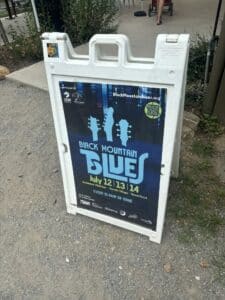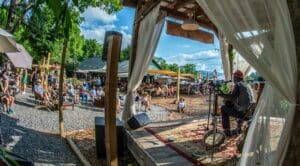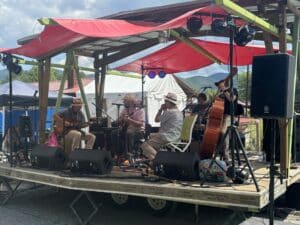Features
Mountain Of Blues In North Carolina

BLACK MOUNTAIN, North Carolina — Zach Hinkle said he’s “never been happier losing money” in his life after co-promoting the first-ever Black Mountain Blues festival in this quaint little mountain town in western North Carolina.
Hinkle serves as proprietor of the White Horse Black Mountain, a small listening room run as a nonprofit in this community of 8,500 residents. Together with LEAF Global Arts, another local nonprofit, the two groups produced the July 12-14 event headlined by Sugar Ray Rayford, Corey Harris and Melody Angel.
They were among the 45 acts playing across six venues in downtown Black Mountain, which in combining performance spaces, added up to capacity of 1,500.
That’s about how many tickets were sold for the blues fest — 1,542 to be exact, according to Hinkle, and half the number of tickets officials expected to sell. Three-day passes cost $80 with single-day tickets $50 and VIP passes $160.
The venues, a mix of indoor and outdoor spaces, ran from the 330-capacity White Horse, which recently went though a $400,000 expansion, to smaller stages at the Bush Farmhouse restaurant and Town Pump tavern, the Railyard, Foothills Grange (try the homemade hot dogs) and the historic Monte Vista Hotel, which dates to 1919 and where more low-key acoustic sessions took place on the hotel porch and backyard gardens.

For White Horse and LEAF, the total budget was $180,000 to put on the festival. Red ink splashed across Black Mountain, but that’s OK, considering the event’s long-term potential, Hinkle said.
“We lost money and it was a large number,” Hinkle said. “If I had to make the choice again, I would do it again. It’s gonna hurt, but you gotta do it, because the energy in those spaces was amazing. We brought the blues back to a place where it belongs, in the mountains. This monetary loss is an investment in the future, because I can’t imagine a single person who came to this festival, not choosing to come next year and telling 10 of their friends about the event. It will sell out in a heartbeat.”
The 2025 event will be held again, most likely in the summer months in Black Mountain, where five-time Grammy Award winner Roberta Flack grew up. In addition, as legend has it, blues pioneer Bessie Smith performed the classic song, “Black Mountain Blues,” after playing the Roseland Gardens in town, the old juke joint that nearly a century ago served as a community center for Black residents to see live music and movies in the segregated Tar Heel State.
Roseland Gardens, which became one of the first integrated gathering spaces in North Carolina, closed in 1976 and was torn down 40 years later, but the spirit of togetherness remains in this community, which lies in stark contrast to other parts of the region, where a pair of huge Confederate flags, a symbol of slavery for many Black Americans, can be seen flying high along Interstate 40 heading to Black Mountain.
“We got a late start and didn’t announce the dates this year until March,” said Leigh Maher, LEAF Global Arts’ chief financial officer and festival director. “The idea only came up early this year and people felt enthusiastic about doing it this summer. If it was just me, I would’ve said, let’s do it next summer, but I’m a more cautious person. Plus, we made some rookie moves. We didn’t incentivize people to buy tickets early and and save money.”
Every festival goes through growing pains, most notably the bottom line. In Black Mountain, some business owners along Cherry Street in the heart of the downtown district weren’t happy about the street being shut down on what is typically one of their busiest weekends of the summer tourism season, coming off the Fourth of July.

FREE WILL: Virginia-bred blues artist Eric Freeman performs an acoustic set outside the Bush Farmhouse, among the festival’s half-dozen stages. (Steve Atkins)
Prior to the event, blues fest organizers had surveyed most business owners who didn’t want the event’s vendor village set up in front of their storefronts. That already happens in the summer during the Sourwood Festival in Black Mountain, an arts and craft event that last year drew 30,000 a day in town, Hinkle said. For the blues fest, the village was placed a few blocks away from the heart of the event, tied to the Railyard, one of the festival’s music venues.
As it turned out, there wasn’t a whole lot of festival foot traffic along Cherry Street to warrant the closure, which isn’t what event producers anticipated. After soliciting feedback from those proprietors over the coming weeks, they could make some logistical adjustments to help accommodate those local business owners that rely so much on the tourism market.
“We did everything we thought was right to make sure they could benefit from this this and we were wrong,” Hinkle said. “At a first-year festival, learning opportunities abound. We’re going to take all those lessons and apply them as best we can next year to limit the issues. Aside from those businesses, the vibe was unbelievable, the music was tremendous and people were telling us for a first-year event, it was the most organized they’ve ever been to.”
The blues fest came about after Maher joined forces with Hinkle and the White Horse to showcase both the history of the blues and its future in a mountain setting. Over the past 30 years, LEAF has run music and cultural festivals in Asheville and Lake Eden, both within a 20-mile radius of Black Mountain.
“We wanted to pay tribute to Black Mountain, which is going through a growth spurt like Asheville has,” Maher said. “Blues seemed like an energetic match for Black Mountain, a smaller bedroom community that has its own level of tourism that’s different from Asheville. There’s little shops and family run businesses owned by people that have grown up here and have long histories with the town.”
Apart from the live music, there were educational sessions at Black Mountain Center for the Arts, themed around women in the music industry; storytelling in the blues; youth in the blues; healing through the blues; and jazz blues, which was led by Adi the Monk, a former Vaishnava Monk who spent eight years living in temples in India and Nepal.
The music itself was stellar and ran the gamut from traditional blues great Mac Arnold and his gasoline can guitar, direct from South Carolina, to Chicago electric blues wizard Melody Angel and Sugaray Rayford, the ex-Marine from Texas who’s made a name for himself over the past 15 years playing festivals across the globe.

LAZYINESS: Lazybirds, a Boone, N.C. roots band, was among the regional performers at Black Mountain Blues. (Don Muret/Staff)
After questioning the sitting audience early in his set — “Is this a jazz crowd?” — Rayford got the crowd of mostly older folks up and dancing during a Saturday matinee set with his rocking blend of blues, soul and R&B. His band featured an all-star lineup of a half-dozen touring veterans, including keyboardist Drake “Munkihaid” Shining (Deep Purple), who sang lead vocals on a cover of Pink Floyd’s “Comfortably Numb.”
Rayford played a second set Saturday night at the Railyard. Corey Harris and Melody Angel also did multiple sets over the weekend.
Guitarist “Steady Rollin’” Bob Margolin, a North Carolina resident who spent seven years performing with Muddy Waters’ band in the 1970s, and Pat “Mother Blues” Cohen were among the other well-established blues artists booked by Melissa McKinney, a blues performer on her own who was a finalist in the 2024 International Blues Challenge competition in Memphis, Tennessee. McKinney’s group, Mama & The Ruckus, performed Saturday at the Railyard.
Lazybirds, a rootsy blues outfit from Boone, North Carolina that incorporates mandolin into their music, did Bessie Smith proud with their rendition of “Black Mountain Blues” as patrons sat in lawn chairs strategically placed under shade trees.
A special treat was guitarist Mike Barnes, who formed the band Blue Sky with Warren Haynes (Gov’t Mule, Allman Brothers) when both were teenagers in Asheville and now teaches music at UNC-Asheville.
For the baby boomer crowd gathered on a Friday afternoon at the White Horse, Mike Barnes & Friends threw out a tasty cover of Robin Trower’s “Day of the Eagle,” in addition to a smoking blues rendition of the Beatles’ classic “Yesterday” and ZZ Top’s “Blue Jean Blues.”
“For me, the music and the way people felt, couldn’t have been better,” McKinney said. “The artists were happy, joyful and kind. There was so much collaboration between the older and the younger performers.”
The future of the blues was represented by artists such as Datrian Johnson & the Family Tree, led by Johnson and his four-octave range in pure soul music, to E’Lon JD, a phenomenal bass player. Both hail from the Asheville area.
“A lot of people were discovering that we have these ridiculously good blues musicians that live around here,” Hinkle said. “We give these local acts an opportunity to shine in front of a larger audience and my hope is that their next four months of gigs are sold out and they can make a living doing the thing that they love and are so good, because we gave them this exposure.”